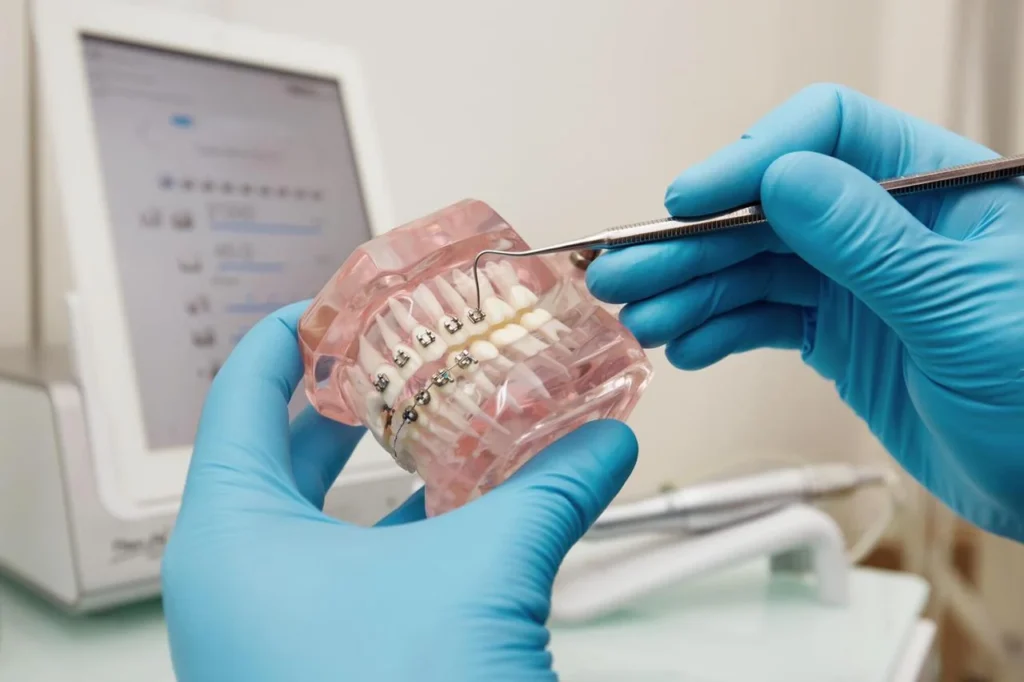When it comes to enhancing quality of life, dental prosthetic services play a crucial role. These services offer new solutions. They are for people who lost their natural teeth due to accidents, gum disease, or other oral health issues. Technology and materials have advanced. Dental prosthetics are now more efficient and comfortable than ever before.
Read on to learn how dental prosthetic services can help.
Types of Dental Prosthetics
There are various types of dental prosthetics that can be used depending on the individual’s needs and preferences. Some common ones include:
Dentures
Dentures are removable replacements for missing teeth and surrounding tissues. They come in two main types: complete dentures and partial dentures. Complete dentures are used when all the teeth are missing, while partial dentures are utilized when some natural teeth remain.
Dentures are custom-made. They use impressions of the patient’s mouth. This ensures a comfy and precise fit. Modern dentures are made from advanced materials. They mimic the look of natural teeth and are durable and strong.
They help restore the ability to chew and speak properly, improving both functionality and aesthetics. You must maintain dentures well. This will make them last longer and keep your mouth healthy.
Dental prosthetic services can show you how to care for dentures. They can also make needed adjustments or repairs.
Dental Bridges
A dental bridge is a fixed prosthetic used to replace one or more missing teeth. It consists of two crowns placed over the natural teeth on either side of the gap, with a false tooth (pontic) in between.
Bridges match the color and shape of the natural teeth. They are custom-made for this purpose. This creates a seamless and natural-looking smile. They also help maintain proper spacing and prevent shifting of adjacent teeth, which can lead to further oral health issues.
With proper care and regular dental check-ups, bridges can last for many years. However, they may need to be replaced over time due to wear and tear. Be sure to get help with a dental emergency if a bridge becomes loose or damaged.
Dental Implants
Dental implants are the most advanced and long-lasting option for replacing missing teeth. They involve surgically placing a titanium post into the jawbone, which acts as a replacement for the tooth root.
Once the implant has healed and fused with the bone, a custom-made crown is attached to the post. This creates a strong and natural-looking replacement tooth.
Implants improve looks and also help preserve jawbone density. They stop it from getting worse. They are also known for their durability and can last a lifetime with proper care.
Implant-Supported Dentures
Implant-supported dentures are a hybrid solution. They combine the benefits of dentures and dental implants.
These dentures are anchored by titanium implants. The implants are surgically placed into the jawbone. They offer a more stable and secure fit than traditional dentures.
There are two main types of implant-supported dentures: bar-retained and ball-retained. Bar-retained dentures use a thin metal bar attached to the implants.
Ball-retained dentures use ball-shaped attachments that snap onto the implants. Both options provide enhanced chewing efficiency and greater comfort.
Implant-supported dentures can help prevent bone loss. They also keep the face’s shape. This is a worry with traditional dentures. This can help oral health and overall well-being in the long run.
All-on-4 Implants
All-on-4 implants offer a full-arch replacement option using just four strategically placed implants. It is for those who have lost multiple teeth in an arch. It provides a stable base for a prosthetic arch of teeth.
All-on-4 implants don’t need adhesives. They stay in place well. This enhances the wearer’s comfort and confidence. This method reduces the need for bone grafting. It also cuts treatment time and gives a set of functional and nice-looking teeth sooner.
Crowns
Dental crowns are custom-made caps that cover a damaged or weakened tooth, improving its strength and appearance. They are often used in conjunction with other dental prosthetics, such as bridges or implants.
Crowns can be made from various materials, including porcelain, ceramic, and metal alloys. Each type has its unique benefits and is suitable for different situations. A reputable dentist or prosthodontist can recommend the best option based on an individual’s needs and budget.
Benefits of Dental Prosthetic Services
Dental prosthetic services offer a range of benefits. This includes:
Restoring and Enhancing Oral Function
One of the primary benefits of dental prosthetic services is the restoration and enhancement of oral function. Missing or damaged teeth can significantly impact an individual’s ability to chew and speak properly.
Dental prosthetics, like dentures, bridges, and implants, replace missing teeth. They let people return to normal oral activities with ease. These prosthetics fill gaps left by missing teeth.
They spread the forces of chewing more evenly. This reduces strain on the natural teeth that remain and improves the bite.
Additionally, dental prosthetics help improve speech clarity. Teeth are crucial for articulating some sounds.
Lack of teeth can cause speech impediments or pronunciation trouble. Prosthetics restore teeth structure, aligning them for clearer communication.
Improving Aesthetics
Dental prosthetic services enhance the aesthetics of an individual’s smile. Missing, damaged, or discolored teeth can affect one’s appearance and self-confidence. By providing natural-looking replacements, dental prosthetics create a more attractive and harmonious smile.
Prosthetics, like crowns, bridges, and veneers, are carefully made. They are made to match the color, shape, and size of the nearby natural teeth.
Modern materials like porcelain and ceramic are strong and durable. They also reflect light like natural enamel, giving a lifelike appearance.
Additionally, dental implants and implant-supported dentures help keep facial structure. They do this by preventing bone loss, which can cause a sunken or aged look.
Dental prosthetics can improve aesthetics. They can have a big impact on a person’s well-being.
A restored smile can boost self-esteem. It can encourage social interactions and make individuals feel more comfortable and confident. This is true in both personal and professional settings.
Maintaining Oral Health
Dental prosthetics improve appearance and function. They also maintain oral health. Missing teeth cause a cascade of oral health issues.
They include shifting of teeth, trouble in cleaning and chewing, and higher risk of gum disease and tooth decay.
Dental prosthetics fill the gaps left by missing teeth. They prevent shifting and keep proper spacing.
They also help distribute chewing forces more , reducing strain on surrounding teeth. This can prevent premature wear and tear of natural teeth, preserving their longevity.
Moreover, dental prosthetics can improve oral hygiene. Some prosthetics need extra care.
They need special cleaning techniques. These promote better oral habits and overall oral health.
Boosting Confidence and Quality of Life
Dental prosthetic services play a crucial role in boosting one’s confidence and overall quality of life. By fixing function, looks, and oral health, people can feel more at ease and confident in their daily activities.
Prosthetics can also have a positive impact on one’s social, personal, and professional life. A restored smile can boost self-esteem. It makes people more willing to socialize and pursue their goals with confidence.
Enhancing Diet and Nutrition
Another benefit of dental prosthetic services is the improvement in diet and nutrition. This can lead to dietary restrictions and a reliance on softer, often less nutritious, foods.
Dental prosthetics, like implants, bridges, and dentures, let people eat a wider variety of foods. This includes foods rich in essential nutrients. Prosthetics enable proper chewing and digestion. They help health and nutrition.
Providing Psychological Comfort
The psychological impact of dental prosthetic services should not be underestimated. Being able to smile, speak, and eat without embarrassment or difficulty can boost mental well-being.
Many people feel anxious due to missing or damaged teeth. This can hurt their social lives and relationships.
Dental prosthetics provide a sense of normalcy and comfort. They allow people to engage more in everyday activities without fear of judgment or ridicule.
Longevity and Durability
Dental prosthetic services are designed with longevity and durability in mind. Prosthetics withstand daily oral wear and tear because of good materials and advanced techniques.
With care and maintenance, dental prosthetics like crowns, bridges, and implants can last for many years. They offer a long-term solution for dental restoration. This durability translates to fewer visits to the dentist for replacements or repairs, saving time and money in the long run.
Customization and Comfort
Dental prosthetics are customizable. This ensures they fit well and work for each person. They provide dentures, bridges, crowns, and implants.
Dental prosthetic services think about the needs and preferences of each patient. Customization means picking the right materials. It also means ensuring proper fit and making needed adjustments.
These steps maximize comfort and function. This approach is personalized. It enhances the experience and satisfaction of those getting dental prosthetics.
Economic Benefits
The initial investment in dental prosthetics might seem big. But, they are often an economic benefit in the long term. Good dental prosthetics can prevent more dental issues.
These issues would need costly treatments, like gum disease, tooth decay, and bone loss. By keeping oral health and reducing the need for future dental care, prosthetics can be a cost-effective solution.
Also, a healthy and confident smile can have a positive impact. It can improve one’s job prospects. It can also help with career advancement.
Factors to Consider When Choosing Dental Prosthetic Services
When choosing dental prosthetic services, you must consider many factors. These factors can impact the quality, longevity, and satisfaction with the treatment. These include:
Qualifications and Experience of the Dental Professional
When choosing dental prosthetic services, the dentist’s qualifications and experience are key. They ensure successful outcomes. You must find a dentist or prosthodontist.
They must have the needed education and certifications in dental prosthetics. This typically includes dental degrees from accredited schools. It also includes extra training in prosthodontics.
Beyond formal education, practical experience is equally essential. A dental professional has much experience in fitting and making dental prosthetics. They are more likely to deliver better results.
You can see this in a strong portfolio of past work. It also comes from patient testimonials and a history of successful treatments.
In addition, ongoing professional development includes workshops, seminars, and advanced courses. These keep the dentist up to date on the latest techniques and technologies. They ensure patients get the best available treatments.
Technology and Materials Used
When considering dental prosthetics, the technology and materials used are critical. They can greatly affect the quality and success of the prosthetics.
Digital imaging, 3D printing, and CAD/CAM systems have revolutionized dental prosthetic creation. These modern advancements in dental technology have made the process faster and more accurate.
These technologies enable precise measurements. They also enable faster fabrication of prosthetics.
The choice of materials also plays a vital role in the durability, functionality, and aesthetics of dental prosthetics. They are made of high-quality materials like zirconia, porcelain, and advanced composites. These materials offer great strength, lastingness, and a natural look.
These materials are biocompatible. They integrate well with natural tissues and do not cause bad reactions.
Patients can benefit from talking with the dental professional. They can discuss the available materials and their benefits. It can help them make informed decisions that best fit their needs and preferences.
Cost and Financial Considerations
The cost of dental prosthetic services can vary widely. It depends on the type of prosthetic, materials, and the treatment’s complexity.
Patients must understand the costs. They should explore payment options before treatment.
Most dental insurance plans cover at least a portion of the cost for dental prosthetics. However, you must check with the insurance provider. You need to determine coverage and any limits or restrictions.
Dental offices help individuals without insurance. They offer payment plans or financing. These spread out the costs over time.
Personal Needs and Preferences
Each individual has unique needs and preferences when it comes to their oral health and appearance. Dental prosthetic services should consider them. They should provide personalized solutions that match an individual’s goals and expectations.
Discuss your needs and preferences with the dentist to get a personalized treatment plan. This includes considering factors such as comfort, aesthetics, durability, and long-term maintenance. Open communication between patients and dental professionals is crucial in achieving satisfactory results.
Getting Help From Dental Prosthetic Services
Dental prosthetic services offer a wide range of benefits that go beyond restoring oral function and aesthetics. These services also contribute to overall health, well-being, and confidence.
Patients can achieve lasting oral health and a great smile by choosing high-quality dental prosthetics. They must align with their goals.
Visit our website for more ideas like this.







